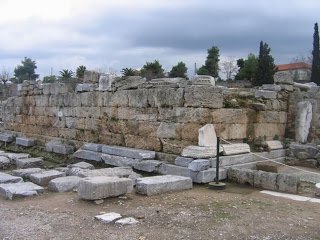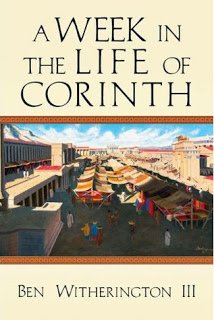
Blog & Resources
Looking for my thoughts on everything from bioethics to movies? You came to the right place. And while you’re here, check out my free downloadable resources.
Sign up to be notified when new posts release.
On Narratives and Central Propositions
Someone asked me this question recently: "Do authors (of classic literature, broadly, and the Bible, specifically) have an agenda/thesis/big idea/etc. in mind before/when they write? Or do they start writing and let an agenda emerge?"
And I said I think it depends on the genre.
If someone picked up a modern hymn book and tried to find a thesis, they’d be hard pressed to do so. Yet they would find a certain organization. I think the same is true with the Psalms. The psalms are a collection. Same with Proverbs. People look for outlines and central ideas on those books and…nada. That may even be the case with Song of Songs. For sure I think those who see a beginning-middle-end structure to Song of Solomon are pressing a later Greek storytelling structure on a 10th-century-BC book that was more likely chiastic if there is actually even a story to it.
I think the apostle Paul did have an organization in mind with the Book of Ephesians. In that book we see such a clear difference between the first half and the second. There's almost no application in the beginning; but it flips and then there's almost no theory at the end. Rather, application (second half) seems to flow from theory (first half).
The Book of Job seems to answer whether there is a clear cause/effect relationship between sin and suffering. (Often not.) But the work addresses a whole lot of other stuff too. Who knows how mountain goats calve? Who names the stars? Who keeps the ocean within its border? Whether the author set out to demonstrate that God is beyond us or whether he wanted to demonstrate how stupid our arguments can be when we accuse the suffering, there does seem to be an argument going, but not a sole argument.
Luke seems really into the insider/outsider emphasis, preparing his readers starting with Gentile women in Jesus's genealogy to accept that the Gentiles are “in.” Then he tells us about Jesus's encounter with the Syrophoenician woman. And the Roman centurion. He emphasizes believing Gentiles in a way we don’t see in other Gospel writers. But I’m not sure that means he set out only to do that when he puts together his history for Theophilus.
I think in Genesis, we’ve missed the boat by going with an "Abraham - Isaac - Jacob - Joseph" outline. If we replaced Joseph with Judah, we’d see that the author following the Messianic line from Genesis 3, and we’d no longer view Tamar’s story as a weird interruption to the Joseph narrative. Instead, that story serves as a pivot point between Judah selling a brother and Judah offering his life for a brother. Wow. Something has changed! This Gentile woman ("outsider") who was not supposed to give a rip about the Messianic line apparently values it more than he ("insider") does. He is ready to do an honor killing when she is actually the righteous one and he is the one deserving death. And in a O'Connor-misfit-like moment, Judah sees himself. Joseph's story then fits how God is preserving that Messianic line, but the focus is on the line. So yeah, I think Moses was going somewhere and not just telling a general history of humanity and then switching to follow Jacob’s family. From the beginning he seems to be tracing God's hand as he keeps his promise to save humanity through the seed of the woman.
Some classic texts have a concept. Tale of Two Cities…tells the story of a substitutionary death for love. But that does not mean every chapter has that idea.
Even J. K. Rowling said early on that she was a member of the Church of Scotland, and that if people knew that about her, they might figure out where her series was “going.” But not every chapter has a central idea/thesis.
Many writers also sit down with some characters in mind, and they don’t know where the story will take them. I didn’t write my novels with a central idea in mind. I wanted to “explore” some “themes.” Most stories are wrecked with too much of a didactic thrust.
I do think we do something bad to great texts when we dissect them to find only the ONE thing. When we re-read the Bible in different seasons, different truths jump out. Okay, I do think it’s doing violence to the text to make the stones in the Goliath story = faith, hope, and love or something that has nothing to do with the actual story. Or to make the story of Lydia only a treatise on women in the business world—which is not how her story functions at all in the Book of Acts. But still, I might identify with the Prodigal’s older brother in one season and with the father in another. And with the prodigal himself in yet another. Jesus told that story to tell listeners something about God and grace, but he also did it in the presence of Pharisees. So the point of view we bring to a story might give us a different take-away from what someone else takes, or even what we ourselves take away in a different season. That is part of the beauty of story.
The beauty of a “Who is my neighbor, Good Samaritan” narrative is that it does way more than provide a dictionary definition of "neighbor." If Jesus was so set on the one thing, a Webster’s definition would have done a better job of closing the gap of potential for “missing IT.”
What do you think? How would you have answered?
A Week in the Life of Corinth
The total effect is the mirror of what happens when fictionwriters don’t know about biblical backgrounds, so they write the Esther storyas a romance. Here a biblical scholar has not mastered the art of writtenstorytelling. And we need both excellent storytelling and good background expertise.(Ben-Hur is an example of a work thatweds the two fields in a way that gives readers a story for the ages.)
 |
| Paul would have been familiar with the "bema" or judgment seat in Corinth. |
Philippians and the Big Story

Today I’m delighted to have as my guest Dr. Lynn H. Cohick, author and Professor of New Testament at Wheaton College and Graduate School. I require Dr. Cohick’s terrific work, Women in the World of the Earliest Christians, for students in my Role of Women in Ministry class at DTS.
Later this month, on October 29, Zondervan will release her latest book, a work on Philippians in The Story of God Bible Commentary series. I'm enthusiastic about this new series because of its emphasis on narrative.
Before we talk specifically about your writing on the book of Philippians, what can you tell us about this new The Story of God Bible Commentary?
The commentary series is an exciting venture. It is very intentional about reading the individual Bible book from some important vantage points.
First, it reads each book as part of a whole—the whole New Testament (NT) and the whole Bible, New Testament and Old Testament (OT). In my case, I looked at Philippians not just as a letter sent to a first century church in Philippi, but in light of Paul’s letters to other churches, in light of the gospels’ declaration of Jesus’ ministry and work on the cross, in light of the church’s convictions on the “rule of faith” or creed that Jesus is the Son of God, the second person of the Trinity, the one who redeems the world and will return again, who is the firstborn of many who will share in his bodily resurrection. And I looked at how Paul’s message to the Philippians drew on the OT, as Paul alludes to the books of Isaiah and Daniel, for example.
Second, it recognizes the importance of hearing the voice of the global church, and the church down through the centuries. Believers around the world are experiencing the power and love of Christ—and I need to hear their witness. Believers down through the centuries have faced and overcome challenges in ways that can instruct me.
Third, this commentary stresses that the individual reader is part of God’s story too. The Story of God commentary series puts front and center God’s invitation within Scripture to participate in His grand story, as servants of Christ. God’s story invites us in. We learn that we are not writing our own story, but God is writing on us and in us his magnificent story for all the ages and forevermore.
Who else uses these commentaries?
I often had in my mind my parents as I wrote this book. They are lay leaders, coming to faith in their late 30s with little Bible knowledge up to that point. They are active in ministry and need a commentary that meets them where they are serving. I also thought about my students and my children, who are in their 20s, who are fired up for Jesus, and who want something in hand that gives insight clearly and quickly. And frankly, I also had in my mind friends who are not Christians, perhaps even of another faith, who might yet be interested to see what Paul wrote. I want Paul’s words to be clearly understood by someone who is not part of the “insider” group or who knows insider lingo.
What is the importance of this particular book in the Bible—Philippians?
Perhaps of greatest importance in this relatively short letter is Paul’s weaving together the nature of Christ (fully God and fully human) and the nature of His church as following his servant modeling. Paul casts a beautiful image of the unity of believers through the power of new life in Christ. Paul extends this picture of a believer’s new life into the next life, where with resurrected, transformed bodies we enjoy Christ’s presence forever. Paul stresses that believers will be transformed when Christ returns, with their own bodies raised immortal. I find many of my students are amazed at this teaching, although the church has declared it in the creeds, “we believe in the resurrection of the body.” But I think too often believers imagine life after death as sitting on a cloud, being somewhat dis-embodied like a ghost, and singing hymns all day and night. For many, including me, that just sounds a bit dull. Yet the new heavens and new earth will be very much alive, and on this new or renewed earth we will live in our resurrected bodies. It is because of this eternal perspective that Paul can stress over and over again to rejoice in the Lord. Two other important aspects of Philippians deserve mention.
First, Paul thanks the Philippians for being a part of his ministry and supporting him financially since they first met. Apparently no other church did that. What a testimony for today—that witness of perseverance and constancy of friendship.
Second, Paul does not hold grudges. He knows that there are some out there who are taking advantage of his inactivity—he’s in prison, perhaps in Rome, although he does not tell us exactly in the letter. Perhaps some Christians in Rome are slandering him by saying something like “I wonder why God has Paul in prison; sure is restricting his witness. Do you think perhaps God is unhappy with Paul’s message?” Paul just lets it run like water of a duck’s back. He does not care if he is personally attacked. I find that generous spirit often lacking today, especially in the anonymity of the blog world. Christians take pot shots at each other, and often speculate on moral reasons for decisions taken, impugning character.
Paul wrote Philippians as a personal letter. He was vulnerable and honest about the ups and downs of ministry. How is that valuable information, for the Philippians and for us?
Often we think of Paul as the Invincible Apostle, with his claim “for me, to live is Christ and to die is gain.” But Paul is clear that he cannot say this by his own power, only in the strength of the Lord. Moreover, while he is prepared to give his life for Christ, he also fully acknowledges the pain of death—the death of friends such as Epaphroditus. He notes his great sadness at the prospect of this co-worker’s death, and rejoices that God spared Paul great sorrow by healing Epaphroditus. This shows, I think, Paul’s realistic understanding of the pain and sorrow that is part of our human existence now, and this makes his call to rejoice all the more poignant because he is not sweeping pain under the rug. Instead, in the face of real sorrow, he centers his mind on the sure hope of Christ’s return and victory over this suffering and death.
Paul encouraged the church to greater fellowship, to more unity. How do you see this as a relevant challenge to today’s church?
Paul pictures the Christian life as being a member of a team whose coach is Jesus Christ. It is not only that one’s personal sins are forgiven by Christ’s work on the cross and resurrection, but also that new life is granted to each believer. This new life begins now, in a new family—the family of God. Each believer is equipped with gifts to help this family. Such a vision can fly in the face of American individualism that stresses “me and Jesus.” Nevertheless, Paul insists that it is “us and Jesus,” that personal salvation includes community membership and responsibility.
You say that the goal of union with Christ is not a happier, more prosperous life here and now. What would you say is the goal?
Paul is very invested in this world, because of his hope in the next. By that I mean, Paul embraces the sufferings that come from a life of service to others in Christ’s name, because in this obedient self-giving, he operates with the power of the resurrection. As an illustration, I have run in a few road races. When I was tired toward the end of the race, if I let my gaze fall down to a few feet in front of me, I began to slow down and think of stopping. But if I lifted my eyes to the horizon and the promise of the finish line, I kept my pace. Paul wants believers to keep their eyes raised to the horizon, from which our Savior will return.
One of the most famous verses in Philippians is 4:13: “I can do all things through Christ who strengthens me.” You say this has been misquoted and misinterpreted many times. What do you believe to be Paul’s original intention?
In Paul’s day, the philosophy of Stoicism was popular. It stressed the power of the mind or reason to overcome all passions. Paul does not embrace this goal, rather he is passionate for Christ, he struggles with his churches, and he longs for Christ’s return. The “all things” in this passage refers to the many struggles and joys that Paul experiences in his ministry; it does not imply that Paul can pick any goal and God will automatically bless it. In the specific context of this quotation, Paul reassures the Philippians that their gift has great impact, but that if they had been unable to make this financial gift, still God would have provided. Paul’s strength comes from Christ, and Paul’s needs are met by God—and sometimes God uses the Philippians to meet the needs of their friend and apostle, Paul.
You can pre-order this book in hardcover or on Kindle by going here.

